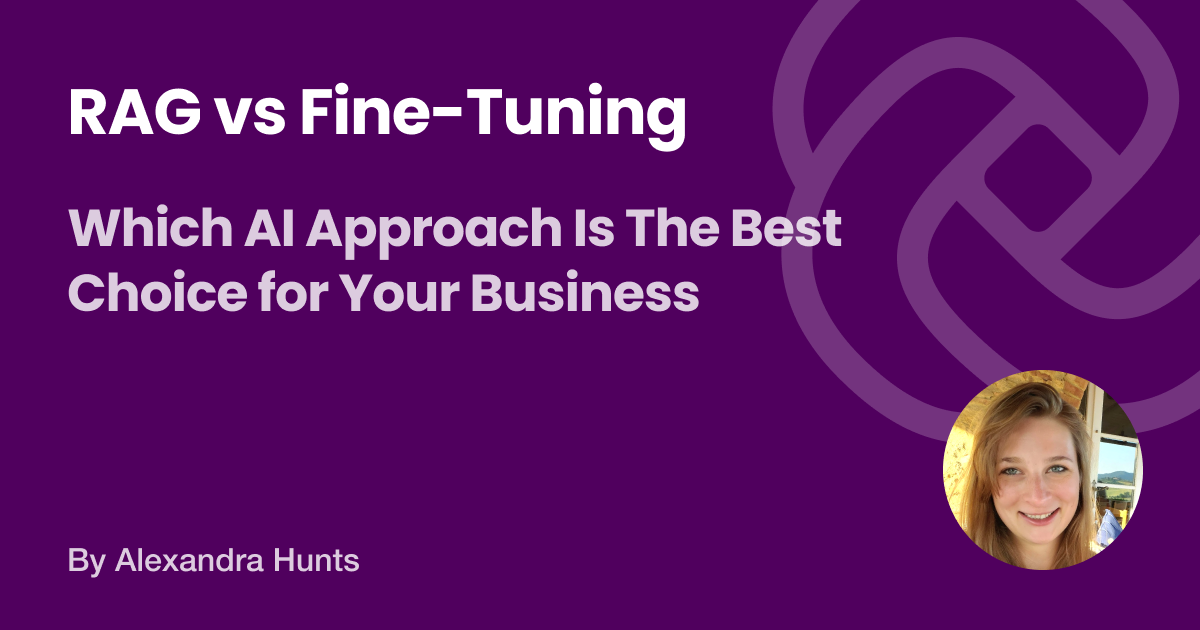
Making sure that LLM outputs are correct and up-to-date is a challenge most businesses face
Retrieval Augmented Generation vs Fine-Tuning – Which AI Approach Is The Best Choice for Your Business
Published on March 26th, 2024
As businesses face rapidly changing landscapes, generative AI that not only understands but also swiftly adapts to the latest information is becoming a crucial requirement. Generalist foundation models without specialized knowledge often no longer suffice; precision-focused models now drive enterprise innovation using domain-specific data. Two strategies that have emerged to help large language models (LLMs) stay up-to-date and have access to business-specific data are fine-tuning and retrieval-augmented generation (RAG), both important approaches yet distinct in their functionality, strengths, and enterprise application.
Using Fine-Tuning to Customize AI
Fine-tuning refines an AI model using a specialized dataset, aligning it more closely with particular business domains or tasks. By building upon an existing foundation model, it teaches the LLM a nuanced understanding relevant to a company's operations. Although fine-tuning excels in customizing AI for specialized needs, it is resource-intensive, depending on quality data and recurring updates, which may lead to substantial ongoing time and money investments.
Moreover, fine-tuning carries the risk of model overfitting, where the AI model becomes too specialized. Models tuned too finely on narrow datasets can become unable to generalize, and thus lose their ability to adapt to new, varied tasks — a critical component for AI systems expected to perform across a diverse set of unforeseen scenarios.
RAG – Rethinking Search
RAG offers a dynamic alternative, circumventing continuous model refinement by fetching up-to-date and external information during the generation process. In contrast to fine-tuning, RAG allows the model to adapt to new information in real-time, crucial in sectors where being current is key. By utilizing in-context learning, RAG allows LLMs to answer using relevant and recent data without falling back on their static internal knowledge.
Although building a robust and scalable RAG pipeline can be complex, it allows for a truly individualized and current generative AI experience. If you are interested in how RAG works and what it requires, check out our previous article on the topic.
The Choice Between Fine-Tuning vs. Retrieval Augmented Generation
The choice between fine-tuning and retrieval-augmented generation doesn't have to be an either/or proposition; in reality, these strategies are not just compatible, but they often reach their peak in performance when used together. While RAG retrieves the most current data to keep the information it provides up-to-date, fine-tuning adjusts the model's output to this newly acquired knowledge. Moreover, fine-tuning can enhance the capabilities of AI with multilingual comprehension, refine the style and tone of communications to echo a brand’s voice, and bolster the AI’s contextual understanding of scenarios outside the typical data set. Harnessing the strengths of both RAG and fine-tuning, businesses gain access to AI that is not only informed by the latest information and private data but is also good at applying this knowledge sensitively across various languages and contexts.
Conclusion
In this ever accelerating world that today's businesses are facing, the use of RAG and fine-tuning represents a strategic advantage for businesses looking to stay ahead. Individually, fine-tuning and RAG may have their constraints, but united they provide a robust framework for generative AI, one that can pivot in real-time to industry changes while speaking in the distinctive tones of a brand. As businesses continue to seek out competitive advantages through AI, understanding and leveraging the complementary strengths of fine-tuning and RAG will be essential. Moving forward, it will not be a question of choosing one over the other but of how best to blend these technologies to serve the dynamic demands of enterprises.
With Omnifact Spaces, implementing a powerful RAG pipeline on your business' data, such as internal documentation or knowledge bases, is easier than ever before, all while protecting your and your employees data and privacy. To see Omnifact Spaces in action, reach out and book a demo today!

